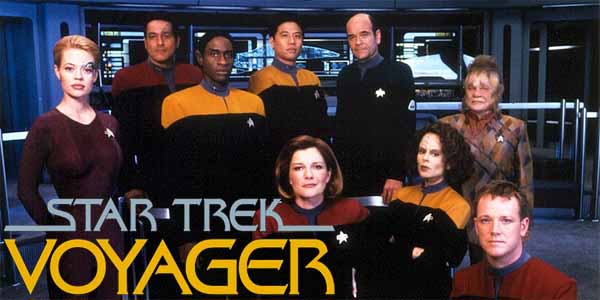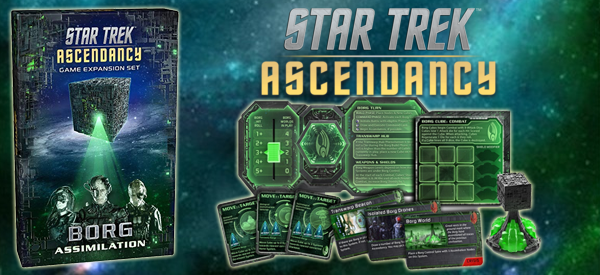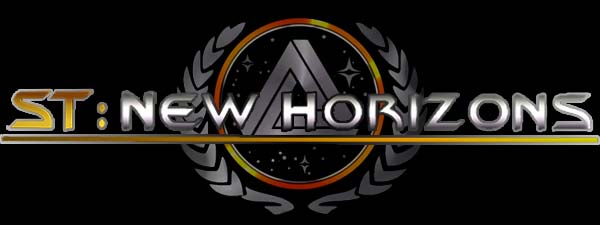
Don't worry, I'm almost done venting my frustrations with Star Trek: Voyager. The first post was about how the show failed to build on its foundations, and the second post was about how the show was a Next Gen copy-cat. This will be the third (and last) post exclusively dedicated to bashing on Voyager. If I decide to write anything further about Voyager, it will probably be about the things that I actually like about the series. I want to re-emphasize that I don't hate Star Trek: Voyager as a TV show. I feel that it was very mediocre, and I'm disappointed that it failed to deliver on its potential.
Even though I don't hate the series as a whole, the one thing that I actually do absolutely loathe about the series is its finale: "Endgame".
Voyager's "Endgame" is a lazy, contrived, cop-out of a finale.
Endgame is one of the worst episodes of Voyager, and might very well be one of the worst episodes in all of Star Trek! OK, it's not "The Omega Glory" or "The Alternative Factor" or "Sub Rosa" bad, but it's pretty terrible! I honestly do not understand how it keeps making lists of "best Voyager episodes". About the only redeeming factor of this episode (in my mind) is that the inclusion of Klingon Captain Korath (and his possession of a time-travel device) indirectly cannonizes Star Trek: the Experience -- and kind of indirectly canonizes me!
"Endgame" is a schlocky action adventure that basically perfectly represents all of Voyager's weaknesses as a show. It's too dependent on its TV-budget CGI Borg special effects. It makes Seven of Nine out to be the most important character on the show (she is the most important character, but the show doesn't have to continually force it down our throats). It's selfish and pretentious. It's fan-servicy.
The inclusion of Captain Korath's time travel device indirectly canonizes Star Trek: the Experience.
"Endgame" is too concerned with its gimmick to really care much about the characters. So much so that it literally manifests a significant (but ultimately arbitrary) romance between two main characters out of nowhere with no build-up at all and in complete contrast to any development that had already been happening. Even the actors thought this romance sub-plot came out of nowhere and blindsided them!
Lastly, "Endgame" is also a rehash of an earlier Voyager episode: "Timeless" (in which Harry Kim goes back in time to save Voyager from crashing), while at the same time trying to be a lazy rehash of TNG's brilliant and beautiful finale "All Good Things..." -- but without the brilliance or beauty.
... [More]
c6c78dcf-37de-431a-b544-93a00cb99a58|4|4.0
Tags:Star Trek, Star Trek: Voyager, U.S.S. Voyager, Endgame, series finale, Delta Quadrant, Starfleet, Borg, Kathryn Janeway, Seven of Nine, Jeri Ryan, Chakotay, Tuvok, Borg Queen, Lyndsay Ballard, Ensign Jetal, Lon Suder, Korath, Star Trek: the Experience, pale blue dot

In my last post, I vented some of my frustrations with Star Trek: Voyager. Primarily, I ranted about how the series mostly failed to follow through with its central premise of being about the ship being lost and isolated on the other side of the galaxy. But I still have more complaints with Voyager. A side effect of the show not following its "lost and alone" premise to its logical conclusion, the show ended up feeling like it was trying too hard to be a Next Generation copy-cat.
Steve Shives also brought up this complaint in his Youtube video "What's My Problem With Voyager?", and I echo the criticism. Voyager had the frustrating habit of retelling stories that had already been told (usually better) in Next Generation. Star Trek shows have always repeated archetype characters, but TNG and Deep Space Nine were very good about paying homage to the earlier shows, without outright copying them.
Many characters feel like slight variations of characters from TOS and TNG.
For example, it could be argued that Data in TNG is a copy-cat of Spock. Dr. McCoy, after all, frequently referred to Spock as a "computer", and Mr. Data is [literally] a computer. But Data isn't a copy-cat of Spock. He's actually more a reflection of Spock (though, admittedly, Spock's arc in the movies and in "Unification" does paint him as being more similar to Data). Spock (in the Original Series) derided his humanity and fought very hard to subdue and quell it. Spock was like a Dr. Jekyll who thought his human half was the monstrous Mr. Hyde. Data, on the other hand, inverts this concept and is more of a Pinocchio (which Riker explicitly spells out for us in "Encounter At Farpoint").
Data wasn't a copy of Spock, he was an inverted reflection.
Also, Spock was dueling with his human half throughout the Original Series and into the movies. That's a dynamic that isn't present in Data at all. That dynamic is present, however, in Worf! Then, of course, there's the whiz kid element of Spock's character, which was transcribed onto Wesley in TNG. So TNG took inspiration from the Original Series' most popular character (Spock), but instead of copying him with minor variations, it split Spock's attributes into multiple characters.
[More]
2c5a81e1-f421-43b4-a73f-c4e9164e3c2a|0|.0
Tags:Star Trek, Star Trek: Voyager, U.S.S. Voyager, Star Trek: the Next Generation, Star Trek: Deep Space Nine, Delta Quadrant, Starfleet, Maquis, Kazon, Hirogen, Borg, Kathryn Janeway, Seven of Nine, The Doctor, Kes, Chakotay, Tuvok, Neelix, Tom Paris, B'Elanna Torres, Harry Kim, Borg Queen, Boothby, Reginald Barclay, Q, Data, Spock, Worf, Quark

A couple years ago, I wrote about the show that I wish Star Trek: Enterrpise had been. Enterprise completely dropped the ball as a prequel and as a bridge between our time and the time of the original Star Trek, by screwing up at fundamental levels of its conception and design. But Enterprise wasn't the first Star Trek series to do this. Its immediate predecessor, Star Trek: Voyager had already started this trend, which has sadly carried onto into all incarnations of Star Trek since.
I rarely talk much about the reasons that I think Voyager is an inferior show to Next Generation and Deep Space Nine. The closest I've come so far was my rant about the Borg, a brief retrospective as part of the 50th anniversary, and a few off-hand jabs at Voyager in some of my other Star Trek posts. This past summer, Steve Shives published a video on Youtube called "What's My Problem with Voyager?" in which he vents some of the same complaints that I have. Steve has some pretty excellent content on his channel, and I highly recommend checking him out if you enjoy my Star Trek content. Anyway, his video inspired me to vent some of my own frustrations with Voyager that he either didn't cover, or for which I feel I have additional insight.
Steve Shives, creator of "Trek, Actually", posted his problem with Voyager on Youtube.
Just like Steve, I want to start by stressing that I don't hate Star Trek: Voyager. I don't think it's as good as its predecessors, but it's perfectly watchable.
When I first started drafting this, it was going to be a short list of complaints. However, as I re-watched the show, the post ballooned with examples. As such, I'm going to split this into several parts. This first part will probably be the longest (so bear with me please) and will focus on what I perceive as a failure of Star Trek: Voyager to adequately build upon the foundations of its premise. The next post will be about how I perceive Voyager as a lazy copycat of The Next Generation.
At a conceptual level, Voyager begins with two foundational pillars: the ship is stranded on the opposite end of the galaxy; and a quarter of the crew has been replaced by Maquis freedom fighters and terrorists instead of trained Starfleet personnel. The show almost completely whiffs on both of these concepts. I would say that there are also two other foundational pillars of the show, but each of these only lasts for half the series. In the first half of the series, a major source of conflict is the fact that Voyager possesses technology far superior to the races and civilizations that it encounters; thus, bringing the Prime Directive into sharp focus and testing the crew's resolve to obey the Directive in such desperate circumstances. In the second half of the series, we have the Borg (which I will be discussing again).
Voyager is isolated and alone, without the resources of the Federation or a starbase.
All four of these are very strong concepts and well worth exploring. Unfortunately, Voyager almost completely abandons its two initial foundations, and (again) completely whifs when it comes to the Borg (though, admittedly, a big part of that is Star Trek: First Contact's fault). The only concept that Voyager really sticks the landing on is the idea of technological disparity between Voyager and its foes in the first couple seasons. [More]
f844da9a-60ad-4a3a-b28a-f06121578938|5|1.8
Tags:Star Trek, Star Trek: Voyager, Star Trek: Enterprise, U.S.S. Voyager, Delta Quadrant, Starfleet, Maquis, Kazon, Hirogen, Borg, Kathryn Janeway, Seven of Nine, Jeri Ryan, The Doctor, Kes, Chakotay, Tuvok, Neelix, Tom Paris, B'Elanna Torres, Harry Kim, Joe Carey, Lyndsay Ballard, Ensign Jetal, Borg Queen, Gilligan's Island, Prime Directive, Steve Shives

One of the weaknesses of Star Trek: Ascendancy (in my opinion) is the simplicity and irrelevance of the game's "minor races". They just sit there waiting to be invaded or hegemonized. They don't even have ships in orbit to defend themselves from attack (or provide the Klingons with an opportunity for some easy culture). I had hoped that there'd be an expansion pack that would give at least the warp-capable civilizations a little bit of agency. Sadly, that hasn't happened yet, but Gale Force 9 has released an expansion that does add an NPC faction: the Borg.
How do Borg allocate damage between multiple fleets?
The Borg are not a player faction (like the excellent Cardassians or Ferengi expansions). The Borg are a non-player "A.I." entity that use a deck of cards to define their behavior. They act in opposition to every player in the game, and are intended to add some extra player-versus-board challenge. The Borg expansion also adds rules for solo and 2-player games, though I'm not terribly happy with how either of those variants plays.
The big problem is that the rules for the Borg cause a lot of confusion. The non-player element of the Borg creates a lot of strange edge cases that the rulesmakers just didn't seem to think through very thoroughly. Some rules leave the Borg's actions somewhat ambiguous, and there are no rules for determining how to resolve such situations. For example, if a Bog cube is battling multiple fleets belonging to the same player, how does it determine which fleet takes damage? We generally house-rule that the Borg attack the largest fleet first, and that the player who activated the cube decides any ties.
The enemy of all my enemies
The bigger problem, however, is that the Borg movement rules lead to considerable balance issues once the Borg are connected to one player, because that poor player now faces the brunt of the entire Borg Collective. Once the Borg have a path to any one player's systems or homeworld, the Borg will exclusively funnel all of their ships down that one path, since it's the only "connected" route available. The only way this will change is for the targeted player to go out of his or her way to try to create another, shorter path to one of the other players (essentially painting a huge target on that player's head). Or I guess one of the other players could accidentally create a shorter path while they're exploring, if they're dumb or not paying particularly close attention. In any case, the problem is that once the Borg become connected to any one player, the Borg stop exploring and looking for the other players, which randomly puts the single player in a disadvantaged defensive position while the other two players are free to build up without much threat of being targeted by the Borg.
Having the Borg in play gives further reason for players to cooperate.
The game tries to offset this by making it so that the Borg become more powerful if they assimilate any worlds (including warp-capable civilizations), or if they assimilate any one player. If your homeworld is assimilated by the Borg, you even get to take over as a Borg player, taking a whole extra Borg turn in which you get to influence how they behave. This is a fun and thematic way of allowing an eliminated player to continue to participate in the game and seek some degree of "revenge" against the other player.
The idea here is that the players shouldn't let the Borg concentrate on wiping out a single player, and we should all partially co-operate in order to keep the Borg in check. There is no actual co-operative victory, so you're only co-operating with each other to the ends of stalling the Borg long enough for you to achieve a victory, at the expense of the other players. There is no "defeating" the Borg.
... [More]

Here's something that I've never done before: a review of a game mod! I don't play mods very often. When I play games, I usually want to play the game that the creators created in order to get a feel for what their intent might have been. For some of the more sandboxy PC games that I play (like Cities: Skylines or the like), I might try some small mods.
There has yet to be an official game quite like Microprose's 1999 release, Birth of the Federation.
For this one instance, however, I'm making an exception because this particular mod fills a very specific niche desire for me that has gone unfulfilled for around 15 or 20 years. The "New Horizons" mod for Stellaris is finally allowing me to play a full 4-x strategy game set in the Star Trek universe. I haven't been able to do that since Star Trek: Birth of the Federation, developed by Microprose for Windows 98!
The creators seem to have been inspired by BotF.
Yes, there have been other Star Trek mods for other games in the past, and there's even some community projects to create spiritual successors to Birth of the Federation (such as Star Trek: Supremacy). The problem is that I've yet to ever see one of these get finished. "New Horizons" for Stellaris is still a work-in-progress, but it is mostly functionally complete and fairly robust. Since Birth of the Federation holds such a special place in my heart, I'm going to take a stab at reviewing "New Horizons" and see how it compares to my personal favorite [official] Star Trek game of all time.
Built on the back of Stellaris
"New Horizons" is, of course, a mod for the PC game Stellaris (developed and published by Paradox). Because of this, it takes advantage of most of Stellaris' strengths, but it is also hamstrung by many of Stellaris' faults.
"New Horizons" makes excellent use of the massive size and scale of Stellaris' maps by featuring a detailed recreation of the canon Star Trek galaxy, and including a surprisingly exhaustive roster of Star Trek races and factions -- all of whom are playable. Yes, of course, the big players like the Federation, the Romulans, Klingons, Cardassians, Ferengi, Dominion, and Borg are all here. As are all the expected ancillary empires like the Gorn, Tholians, Orions, and so forth.
The playable roster is surprisingly vast and exhaustive.
It doesn't end there, though. This mod also features a crap-ton of "aliens of the week" as fully-featured, playable empires. They aren't "minor races" like what we had in Birth of the Federation or the city states of Civilization V or VI. They don't just have one planet and a handful of ships just waiting for a "major faction" to conquer or absorb them. The obvious choices like the Vulcans, Andorians, Bajorans, are all there. The game also features empires like the Sheliak, Anticans, Selay, Caitian, Cheron, Dosi, Hirogen, Kazon, Krenim, Kelpian, and more! If you have a favorite space-facing civilization from any episode of Star Trek (including Gamma Quadrant aliens from DS9 and Delta Quadrant aliens from Voyager), there is a very good chance that it's a playable faction in "New Horizons"... [More]
2c39f87b-9de4-4abc-b74c-781e4f27c822|0|.0
Tags:Stellaris, Star Trek, New Horizons, Stellaris: New Horizons, mod, PC, Steam, 4x, strategy, user interface, space, exploration, war, starship, starbase, warp drive, glitch, casus belli, Star Trek: Birth of the Federation, Star Trek: the Next Generation, Star Trek: Deep Space Nine, Star Trek: Voyager, Star Trek: Enterprise, Star Trek: Discovery, Star Trek: Beyond, Star Trek II: the Wrath of Khan, Star Trek VI: the Undiscovered Country, Federation, Klingon, Romulan, Cardassian, Ferengi, Dominion, Borg, Gorn, Tholian, Orion Syndicate, Vulcan, Andorian, Tellarite, Kazon, Hirogen, Alpha Quadrant, Beta Quadrant, Gamma Quadrant, Delta Quadrant
|

| 12 | | | | | | | 60 | | 11 | | | | | | | 55 | | 10 | | | | | | | 50 | | 09 | | | | | | | 45 | | 08 | | | | | | | 40 | | 07 | | | | | | | 35 | | 06 | | | | | | | 30 | | 05 | | | | | | | 25 | | 04 | | | | | | | 20 | | 03 | | | | | | | 15 | | 02 | | | | | | | 10 | | 01 | | | | | | | 05 |
|